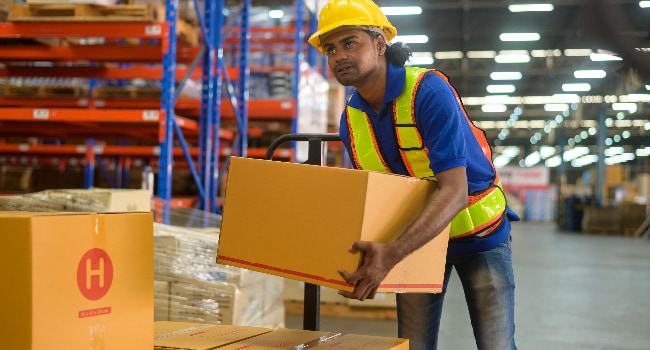A1 Quality Logistical Solutions

- By Haley
- May 1, 2025
Table of Contents
Key Highlights
- Lumpers are essential for efficient last-mile delivery, ensuring timely and damage-free unloading at warehouses and distribution centers.
- These skilled laborers specialize in handling various types of freight, including perishable goods, industrial materials, and retail merchandise.
- By speeding up the unloading process, lumpers help truck drivers get back on the road quickly, maximizing efficiency and minimizing downtime.
- Their expertise in freight handling significantly reduces the risk of damage, leading to fewer insurance claims and disputes.
- Lumpers play a vital role in maintaining supply chain velocity and customer satisfaction, ensuring goods reach consumers on time and in optimal condition.
Introduction
Lumpers are often not noticed, but they are a key part of the supply chain process. Lumper fees are common in trucking, but these workers do much more than just unloading trucks. They help improve last-mile delivery. This efforts directly affect the time truck drivers take, the speed of the supply chain, and customer satisfaction as well.
Understanding Lumpers and Their Role in Last Mile Delivery
Last-mile delivery is the last part of the supply chain. It can be the hardest and most time-critical phase. Here, goods move from transportation hubs to their final spots, like retail stores, distribution centers, or directly to customers. This important stage needs speed, precision, and careful handling. This is especially true with the rising need for quicker delivery times.
Lumpers play a key role in this process. They are skilled in handling freight. Their work helps make unloading smoother and quicker, avoiding delays at distribution centers. By managing the tough job of unloading, they allow truck drivers to concentrate on driving, which is what they do best.

Defining Lumpers: Who They Are and What They Do
Lumpers are workers who load and unload freight in different parts of the supply chain. You can usually find them at warehouses, distribution centers, and loading docks. They help truck drivers and logistics companies. Unlike regular warehouse workers, lumpers are often hired as third-party contractors and get paid for each job they do.
The name “lumper” comes from the way they are paid a lump sum for a task instead of earning an hourly wage. This setup encourages them to work quickly and efficiently so they can earn more money.
Although they might not be seen often, lumpers are a key part of the supply chain. They help keep goods moving from manufacturers to consumers. Their skills and quick work make the logistics network faster and more reliable.
The Critical Tasks Lumpers Perform in the Delivery Process
The unloading process might seem simple, but it can take a lot of time and effort. This is especially true for big shipments or fragile items. Lumpers are experts who help with unloading. They make sure to remove goods from trucks safely and quickly. This reduces the chance of damage or delays.
Lumpers know how to handle different types of freight. They can manage palletized goods and loose items, which need special handling. By making the unloading process better at distribution centers and warehouses, lumpers are key to keeping the supply chain running smoothly.
Their quick work helps truck drivers move on to their next load faster. This increases their productivity and reduces expensive delays. As a result, there are quicker delivery times and happier customers, which improves overall supply chain speed.
Why Lumpers Are Essential for Efficient Last Mile Delivery
Lumpers are not just an extra cost in delivery. They are an investment in making things work better and keeping customers happy. Their special skills help make operations smoother and deliveries faster.
By improving the unloading process and safely handling goods, lumpers become important partners for easy last-mile delivery. Their role is especially vital today, as people want quick and reliable deliveries in the busy world of online shopping.

Speeding Up the Unloading Process
The unloading process can slow things down, but lumpers help speed this up. They have the knowledge and skills needed to unload shipments quickly and effectively.
Their understanding of warehouse layouts helps them handle pallets well. They also know how to stack goods properly. This helps trucks unload faster. When lumpers make the unloading process quicker, delivery vehicles spend less time waiting. This allows drivers to get to their next stop without delays.
Because of this efficiency, customers receive their orders faster. Overall, this helps improve the supply chain speed. In a fast-paced market, lumpers are key partners in meeting and surpassing what customers expect.
Reducing Errors and Damage During Freight Handling
The safe and efficient handling of freight is very important in last-mile delivery. Lumpers play a key role in reducing mistakes and preventing damage. They have special training that helps them know how to handle different types of freight. This training ensures they use the right techniques to avoid any mishandling.
When businesses trust lumpers with the unloading process, they lower the risk of injury to their workers. This also helps reduce freight damage. This smart approach leads to fewer insurance claims and less worry about liability. Overall, it improves safety in the supply chain.
Lumpers also pay close attention to detail when they unload. They inspect goods for any signs of damage. This helps them quickly find and report any problems. This way, losses are minimized, and only the best products make it to their final destination.
Types of Goods Handled by Lumpers in Various Industries
Lumpers do much more than just unload boxes. They work with different types of goods in many industries. They change their skills to fit the needs of each type of cargo. This range of skills makes them important in various sectors. They help ensure that specialized freight is handled safely and efficiently.
They manage everything, from fragile food items needing cooled storage to heavy industrial items that require careful moving. Lumpers have the knowledge and experience to handle the special challenges in each industry.

Handling Perishable Goods and Ensuring Freshness
The food industry needs controlled logistics to bring fresh produce, dairy, and frozen items to people. Lumpers help keep the quality and freshness of perishable products during the unloading process.
Lumpers know how to handle items that need specific temperatures. They work quickly and carefully. This reduces the time that perishables are outside of controlled environments. They also know how to stack and rotate items properly. This means they make sure older products are unloaded and given out first, which helps reduce spoilage and waste.
This focus on freshness and quality helps keep customers happy and protects the good name of food retailers and distributors. By making sure perishables arrive at homes in great shape, lumpers play a big part in the food industry’s success.
Managing Industrial Materials with Care and Precision
Industrial materials are often heavy and bulky. They need special care during the unloading process. Lumpers are experts who know how to handle such cargo carefully. They use the right tools to unload these materials without causing damage or hurting anyone.
Lumpers have skills in using pallet jacks, forklifts, and other equipment. This allows them to move heavy items quickly and safely. They pay close attention to weight balance, stacking items securely, and tying them down properly. These actions help prevent accidents and keep valuable goods safe.
Having these skilled workers is beneficial in industries like warehousing, manufacturing, construction and energy. It’s essential to receive undamaged materials on time to keep the work running smoothly and meet deadlines. The hard work and knowledge of lumpers help these industries run well.
The Impact of Lumpers on Business Efficiency and Customer Satisfaction
Lumpers may work mostly out of sight, but they help a lot with both things. Their work in making last-mile delivery smoother helps a business earn more money and build customer loyalty.
With faster service, less chance of damage, and better driver output, efficient lumper services lead to great results. This means lower costs, quicker delivery, and happier customers, which helps create a good brand image and stronger ties with customers.

Case Studies: Successful Last Mile Deliveries with Lumper Involvement
Real-world examples demonstrate the tangible impact of lumper services on successful last-mile deliveries. Companies across various industries have witnessed significant improvements in their logistics operations and customer satisfaction by integrating lumpers into their delivery strategies.
Company | Industry | Challenge | Solution | Results |
FastGrocers | Online Grocery Delivery | Meeting increasing delivery demands while maintaining produce freshness | Partnered with a lumper service specializing in perishable goods handling | Reduced delivery times by 20%, significantly decreased product spoilage, and boosted customer satisfaction ratings |
BuildCo | Construction Supplies | Unloading delays causing project setbacks and increased labor costs | Implemented a dedicated lumper team at their distribution center | Improved unloading efficiency by 30%, minimizing project delays, and reducing overall labor expenses |
These case studies highlight how incorporating professional lumper services translates into tangible benefits, improving efficiency, optimizing resource allocation, and ultimately driving greater customer satisfaction. The investment in specialized unloading labor yields a positive ripple effect throughout the supply chain.
Business Testimonials: The Untold Benefits of Employing Lumpers
These real experiences show how lumper services help make operations more efficient and focused on customers.
“Since we started using lumper services for our last-mile delivery, our delivery times have greatly improved,” says a logistics manager at a big electronics store. “Our drivers don’t waste hours unloading anymore. This means they can make more deliveries and get products to our customers faster.”
Another common point in these business stories is the decrease in damage. A warehouse manager at a furniture company shares their good news: “Lumpers have greatly cut down the number of damaged goods during unloading. Their careful work and focus on detail have saved us thousands of dollars.”
Conclusion
In conclusion, lumpers are skilled laborers specialize in handling various types of freight, including perishable goods, industrial materials, and retail merchandise. They have expertise in freight handling and significantly impact loading and unloading processes, which helps keep truckers on the road and product moving through the supply chain efficiently. When businesses trust lumpers with the unloading process, they lower the risk of injury to their workers.
Frequently Asked Questions
Can lumpers handle international freight?
Yes, lumpers can manage international freight. Many lumper services focus on the logistics of unloading and loading shipments for international shipping. They work closely with the trucking industry to deal with the details of the global market.
What training do lumpers receive to manage last mile deliveries efficiently?
Training for lumpers usually includes learning how to handle freight properly, follow safety rules for unloading, and manage pallets effectively. Some specialized lumper services, such as EZ Lumper services, offer extra training on lumper receipt procedures and using digital documents. This helps make operations run smoothly.

Haley serves as the Marketing Manager for A1 Quality Logistical Solutions. She joined A1QLS in 2023 with her prior experience gained with GXO and XPO Logistics.
